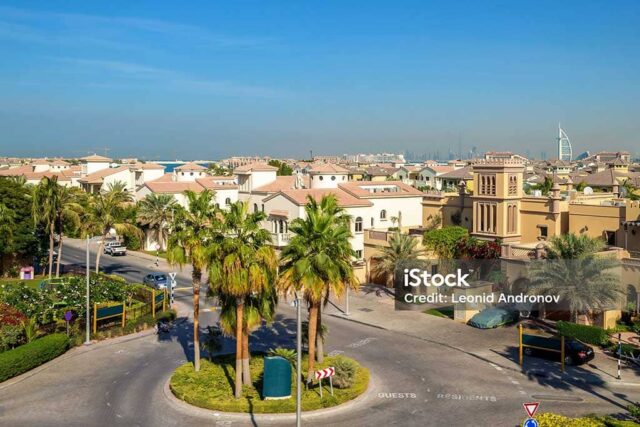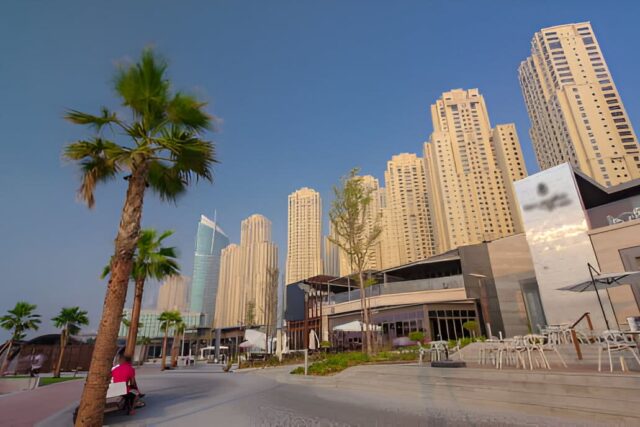
Introduction
Dubai has become one of the most sought-after real estate markets in the world, attracting investors and homebuyers alike. With its luxurious properties, tax-free environment, and investor-friendly policies, Dubai offers a unique and lucrative real estate landscape. However, buying property in Dubai requires a thorough understanding of the market, legal regulations, and financial considerations. This guide provides an in-depth overview of everything you need to know before purchasing real estate in Dubai.
Understanding Dubai’s Property Market
Dubai’s real estate market is diverse, offering a range of options from high-rise apartments and waterfront villas to commercial spaces and plots of land. The city is known for its freehold property zones, where foreigners can own property outright. Some of the most popular areas for real estate investment include Downtown Dubai, Palm Jumeirah, Dubai Marina, and Jumeirah Village Circle.
The property market in Dubai fluctuates based on economic trends, government initiatives, and global real estate movements. Before making a purchase, it’s essential to conduct market research or consult with a real estate expert to understand price trends, rental yields, and future growth potential. Dubai’s real estate sector is also shaped by policies such as the Golden Visa program and foreign ownership rights, which have contributed to an increase in international investments.
Freehold vs. Leasehold Properties
Foreign investors and expatriates can buy real estate in Dubai within designated freehold areas. Freehold properties offer full ownership rights, allowing buyers to sell, lease, or pass the property to heirs. Some of the most prominent freehold zones include Dubai Marina, Business Bay, and Emirates Hills. These areas provide access to world-class amenities, high rental demand, and long-term appreciation potential.
In contrast, leasehold properties are available for purchase with long-term leases, typically ranging from 10 to 99 years. These properties are often located in areas such as Deira and parts of Jumeirah. While leasehold properties can be more affordable, they come with restrictions on modifications and resale. Buyers must also adhere to the lease agreements and obtain approvals for renovations or structural changes from the landowner.
Steps to Buying Property in Dubai
- Define Your Budget and Financing Options
Before starting your property search, determine your budget and explore financing options. Mortgage loans are available for both residents and non-residents, with banks requiring a down payment of at least 20-25% for residents and 35-50% for non-residents. Keep in mind additional costs such as registration fees, agency commissions, and maintenance charges.
Buyers should also consider pre-approved mortgage options, as having financing secured in advance can strengthen negotiations with sellers. Additionally, understanding the differences between fixed-rate and variable-rate mortgages can help buyers choose the most suitable loan structure.
- Choose the Right Property
Selecting the right property depends on your purpose—whether for personal residence, rental income, or long-term investment. Consider factors such as location, property type, amenities, and future development prospects. For those seeking high returns, areas near upcoming infrastructure projects and business districts offer significant appreciation potential.
Additionally, researching planned developments, public transport accessibility, and nearby commercial hubs can ensure long-term value and convenience.
- Engage with a Real Estate Agent
Working with a certified real estate agent can simplify the buying process. Choose an agent registered with the Dubai Land Department (DLD) to ensure transparency and legal compliance. Agents provide market insights, facilitate negotiations, and guide buyers through the legal procedures.
A professional agent can also help identify off-plan property opportunities, which often come with attractive payment plans and lower initial costs compared to ready properties.
- Make an Offer and Sign the Memorandum of Understanding (MoU)
Once you’ve selected a property, negotiate the price and terms with the seller. If both parties agree, an MoU is signed, outlining the agreed terms and deposit amount (usually 10% of the property price). The buyer should ensure that all conditions, including payment schedules and handover dates, are clearly stated in the MoU.
- Obtain a No Objection Certificate (NOC)
For property transfers, the seller must obtain an NOC from the developer, confirming that all fees are cleared and there are no objections to the sale. The developer may charge a fee for issuing the NOC, and the process typically takes a few days to complete.
- Transfer Ownership at the Dubai Land Department (DLD)
The final step is to transfer the property title at the DLD, where the buyer pays the remaining balance, transfer fees, and receives the new title deed in their name. This step ensures legal ownership and registration with the authorities.
Buyers should verify the required documents beforehand, including Emirates ID (if applicable), passport copies, and proof of funds, to avoid delays during the transfer process.
Legal Considerations and Regulations
Buying real estate in Dubai involves specific legal requirements, including:
- Title Deed Registration: Every property purchase must be registered with the DLD to ensure legal ownership.
- Oqood Registration (for off-plan properties): If purchasing an under-construction property, it must be registered under the Oqood system to protect buyer rights.
- Property Visa: Investors purchasing properties worth AED 750,000 or more may be eligible for a residency visa under certain conditions.
- Homeowners Association Fees: Buyers of apartments and villas in communities must pay annual service charges for maintenance and facilities.
Additionally, investors should be aware of Dubai’s escrow account regulations for off-plan projects. These rules require developers to deposit buyer funds into regulated escrow accounts, ensuring project completion and protecting investor interests.
Additional Costs to Consider
In addition to the property price, buyers should account for various additional costs. The Dubai Land Department (DLD) registration fee amounts to 4% of the property value, while real estate agent commissions typically stand at 2% of the property price. If a mortgage is involved, buyers must pay a mortgage registration fee of 0.25% of the loan amount. Annual service charges vary based on the property type and location, covering maintenance and facility management.
Other potential costs include property insurance, furnishing expenses, and utility connection fees. Buyers should also factor in post-purchase maintenance, particularly for villas with private pools and gardens. Ensuring a budget that accounts for these extra expenses can help buyers avoid unexpected financial burdens after the purchase.
Conclusion
Buying property in Dubai is a rewarding investment, offering high returns and long-term growth potential. However, navigating the real estate market requires careful planning, financial preparation, and legal awareness. By understanding the property landscape, securing the right financing, and working with registered professionals, buyers can make informed decisions and maximize their investment potential in Dubai’s thriving real estate sector.
As the city continues to evolve with new developments and infrastructure projects, Dubai remains one of the most attractive real estate destinations globally. Whether you’re looking for a dream home or a strategic investment, Dubai’s diverse property market offers endless possibilities for buyers.
Start your journey today and be part of a city that’s shaping the future by contacting UAE Property Pros today.





Leave a Reply